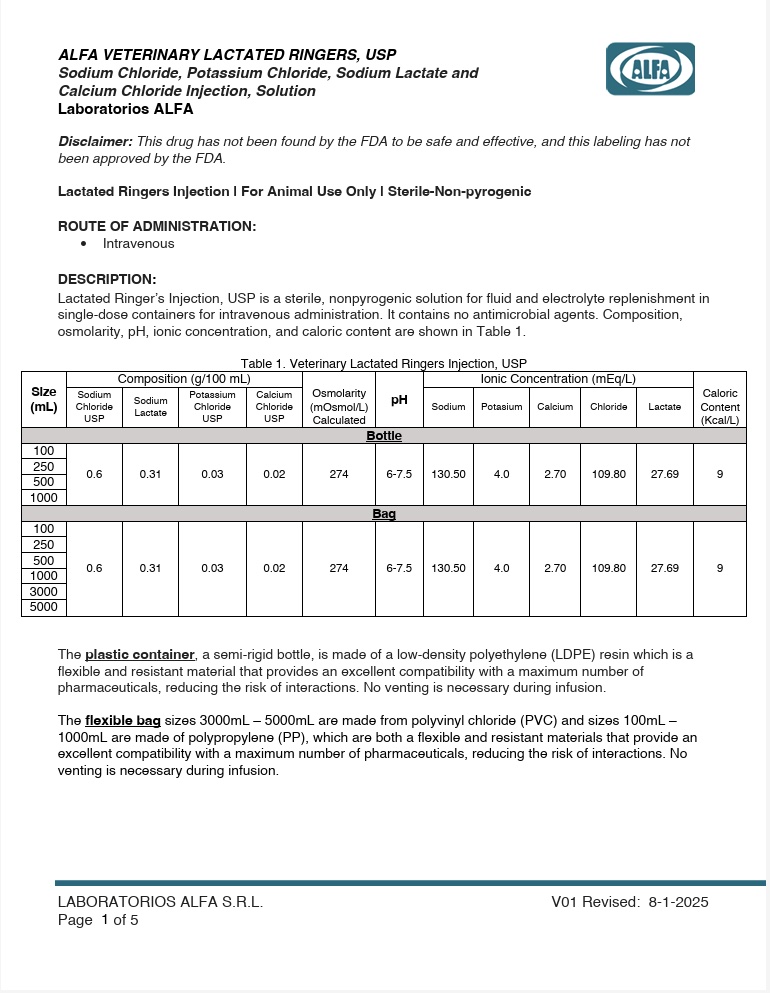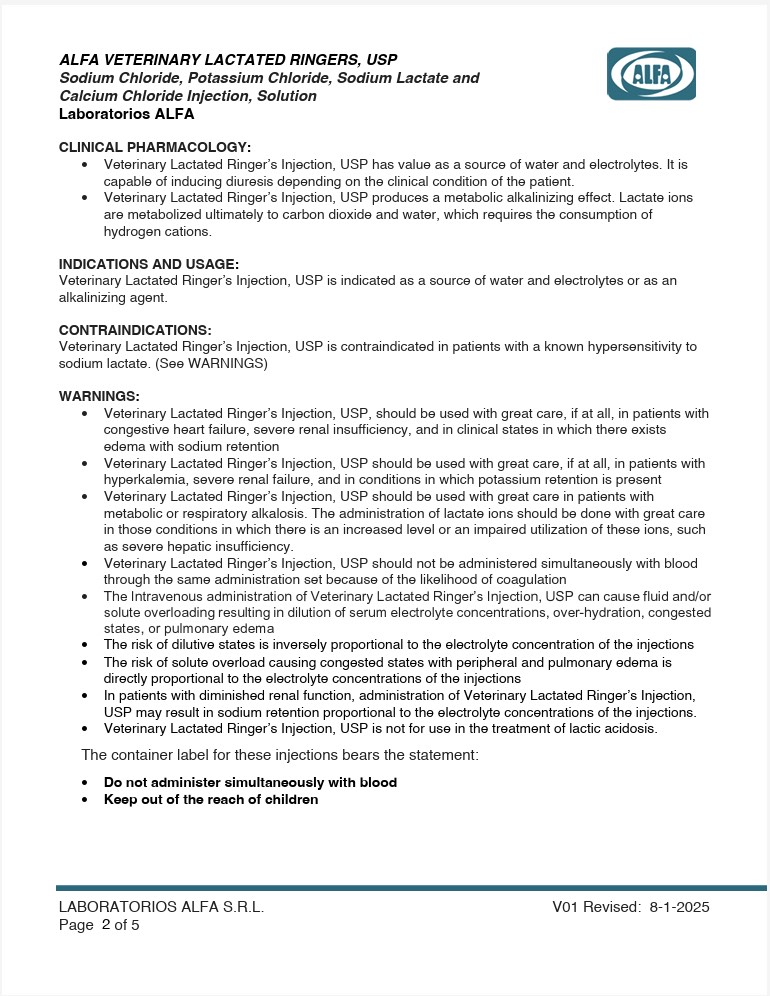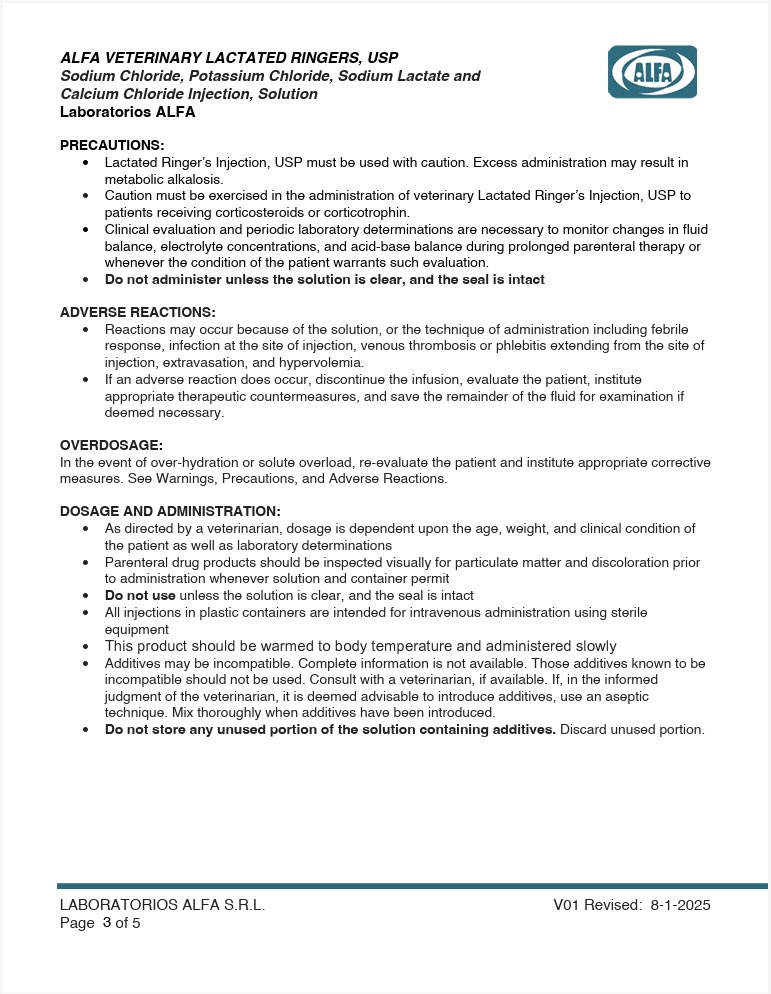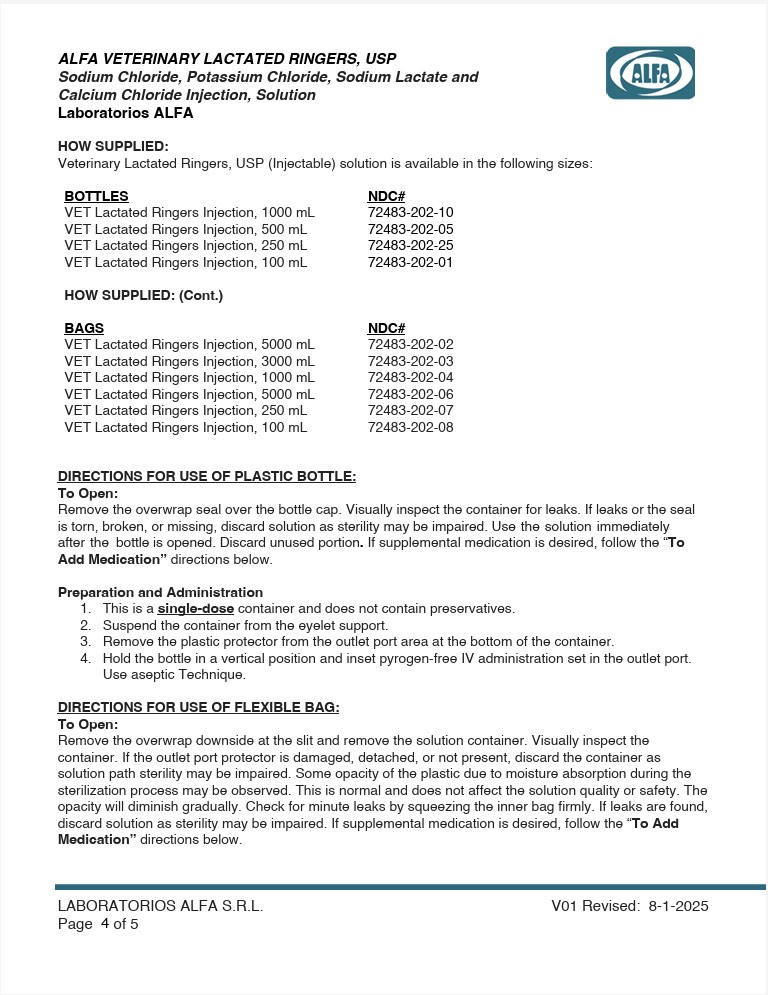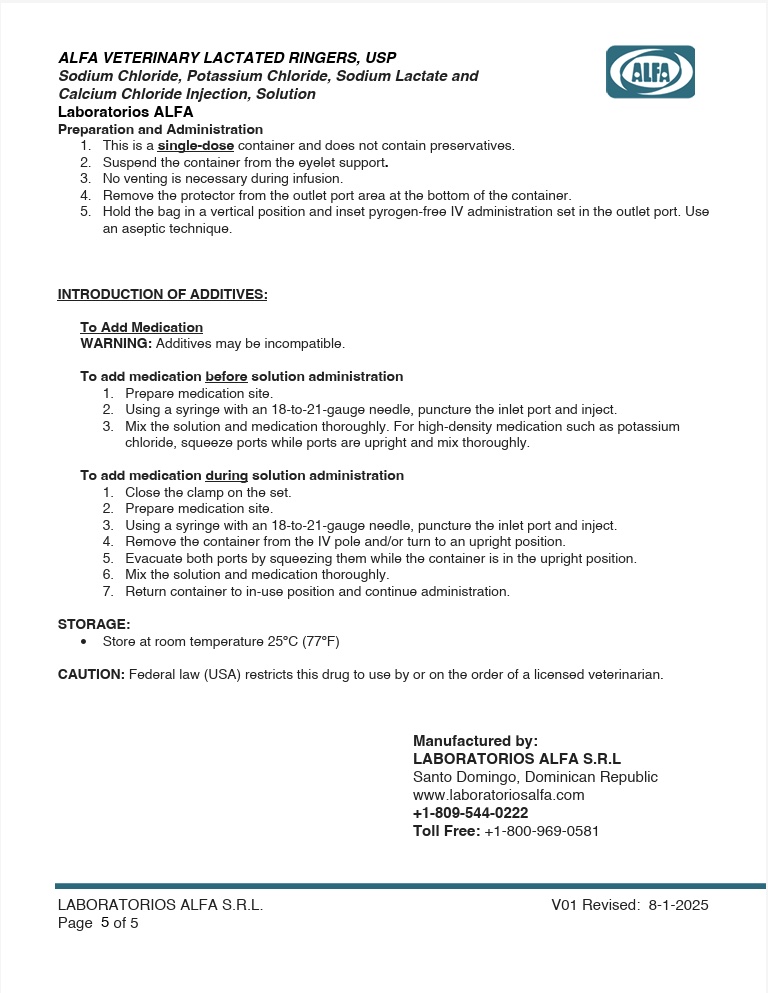Alfa Veterinary Lactated Ringers
1eff6801-d00f-4430-a815-0a4720bb35d2
PRESCRIPTION ANIMAL DRUG LABEL
Aug 13, 2025
Laboratorios Alfa SRL
DUNS: 815941244
Products 1
Detailed information about drug products covered under this FDA approval, including NDC codes, dosage forms, ingredients, and administration routes.
lactated ringers sodium chloride,sodium lactate, potassium chloride,calcium chloride
Product Details
FDA regulatory identification and product classification information
FDA Identifiers
Product Classification
Product Specifications
INGREDIENTS (4)
Drug Labeling Information
PACKAGE LABEL.PRINCIPAL DISPLAY PANEL
PRINCIPAL DISPLAY PANEL (BAG)
LACTATED RINGER’S INJECTION , USP
Veterinary Use
Sterile and NonProgenic Solution
Keep out of reach of Children.
For Animal Use Only.
Take Time - Observe label directions
Manufactured by:
Laboratorios Alfa, SRL
Santo Domingo
Domincan Republic
www.laboratoriosalfa.com
+1-809-544-0222
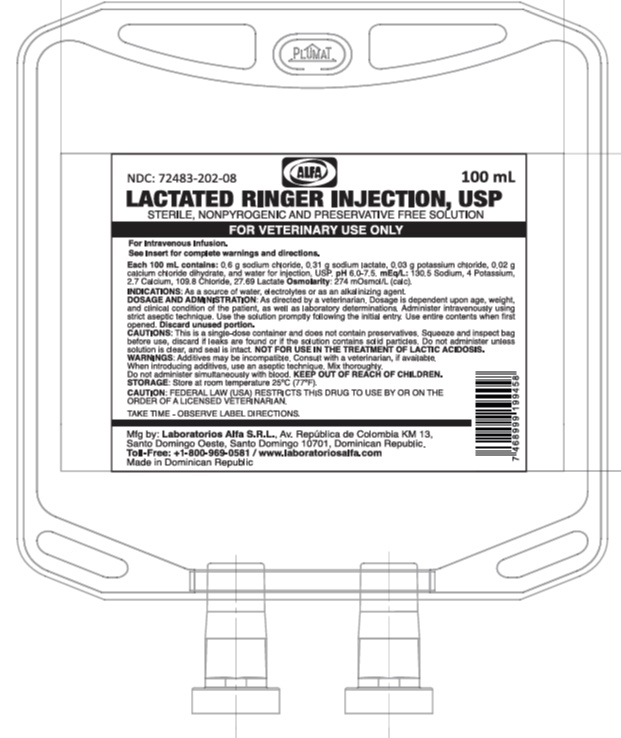
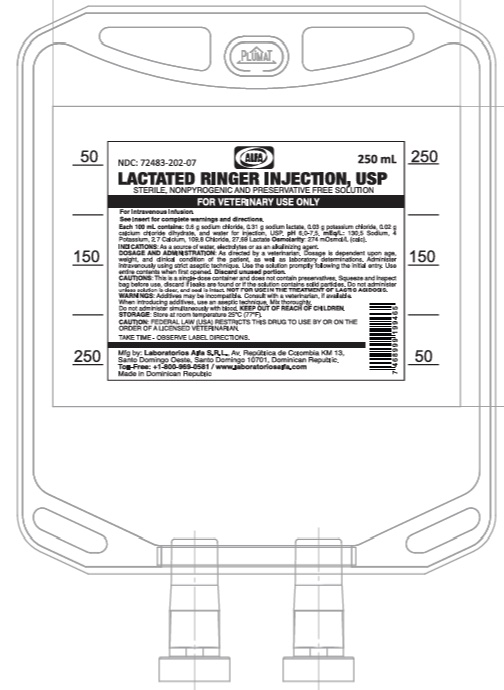
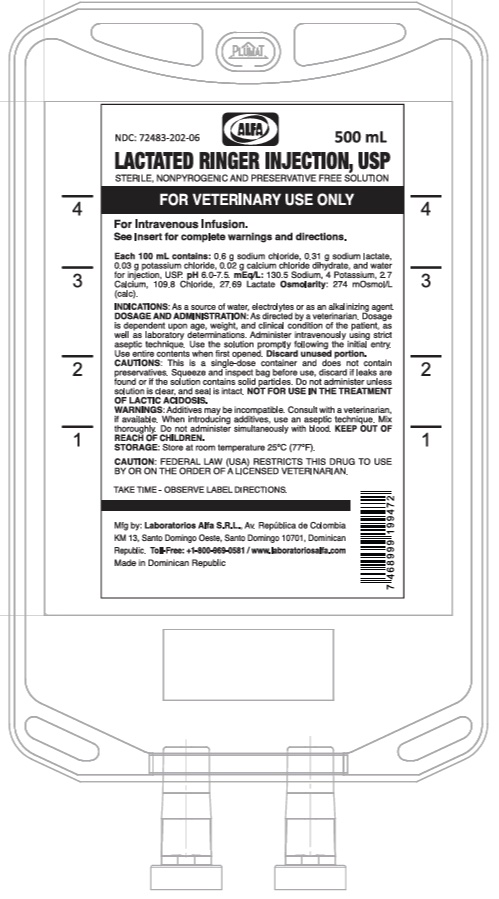
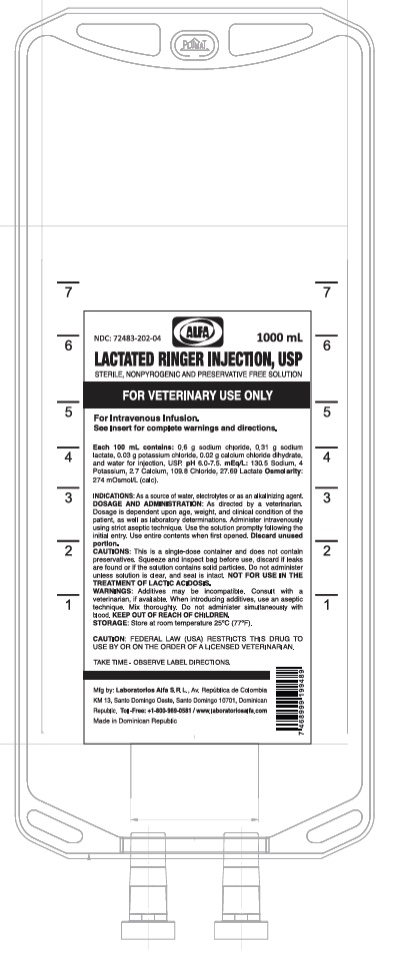
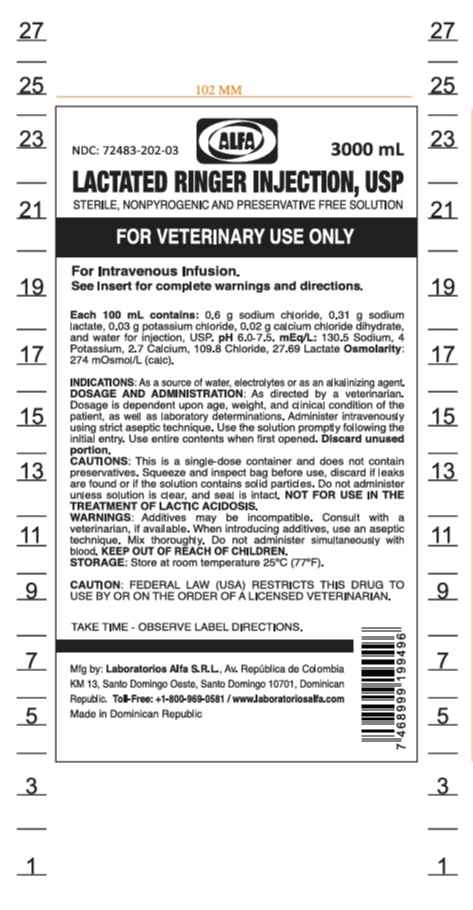
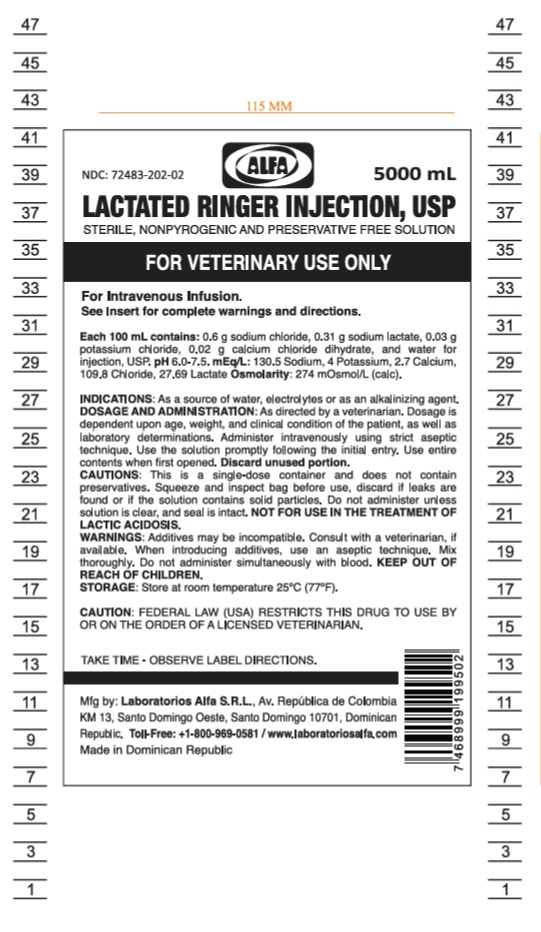
INDICATIONS & USAGE SECTION
INDICATIONS AND USAGE
Veterinary Lactated Ringer’s Injection, USP is indicated as a source of water and electrolytes or as an alkalinizing agent.
CONTRAINDICATIONS SECTION
CONTRAINDICATIONS
Veterinary Lactated Ringer’s Injection, USP is contraindicated in patients with a known hypersensitivity to sodium lactate.
ADVERSE REACTIONS SECTION
ADVERSE REACTIONS
Reactions which may occur because of the solution or the technique of administration include febrile response, infection at the site of injection, venous thrombosis or phlebitis extending from the site of injection, extravasation and hypervolemia.
If an adverse reaction does occur, discontinue the infusion, evaluate the patient, institute appropriate therapeutic countermeasures and save the remainder of the fluid for examination if deemed necessary.
DESCRIPTION SECTION
DESCRIPTION
Veterinary Lactated Ringers Injection, USP is a sterile, non-pyrogenic solution for fluid replenishment
in single dose containers for intravenous administration. Discard unused portion. It contains no antimicrobial agents.
Table 1.Veterinary Lactated Ringers Injection, USP|
Size mL |
Composition (g/100 mL) |
Osmolarity |
pH |
Ionic Concentration (mEq/L) |
Caloric | |||||||
|
Sodium Chloride |
Sodium Lactate |
Potassium |
Calcium |
Sodium |
Potasium |
Calcium |
Chloride |
Lactate | ||||
|
100 |
0.6 |
0.31 |
0.03 |
0.02 |
274 |
6-7.5 |
130.50 |
4.0 |
2.70 |
109.80 |
27.69 |
9 |
|
250 | ||||||||||||
|
500 | ||||||||||||
|
1000 |
No venting is necessary during infusion.
CLINICAL PHARMACOLOGY SECTION
CLINICAL PHARMACOLOGY
Veterinary Lactated Ringer’s Injection, USP has value as a source of water, electrolytes. It is capable of inducing diuresis depending on the clinical condition of the patient.
Veterinary Lactated Ringer’s Injection, USP produces a metabolic alkalinizing effect. Lactate ions are metabolized ultimately to carbon dioxide and water, which requires the consumption of hydrogen cautions.
WARNINGS SECTION
WARNINGS
Veterinary Lactated Ringer’s Injection, USP, should be used with great care, if at all, in patients with congestive heart failure, severe renal insufficiency, and in clinical states in which there exists edema with sodium retention.
Veterinary Lactated Ringer’s Injection, USP should be used with great care, if at all, in patients with hyperkalemia, severe renal failure, and in conditions in which potassium retention is present.
Veterinary Lactated Ringer’s Injection, USP should be used with great care in patients with metabolic or respiratory alkalosis. The administration of lactate ions should be done with great care in those conditions in which there is an increased level or an impaired utilization of these ions, such as severe hepatic insufficiency.
Veterinary Lactated Ringer’s Injection, USP should not be administered simultaneously with blood through the same administration set because of the likelihood of coagulation.
The container label for these injections bears the statement:** Do not administer simultaneously with blood.**
The intravenous administration of Veterinary Lactated Ringer’s Injection, USP can cause fluid and/or solute overloading resulting in dilution of serum electrolyte concentrations, over-hydration, congested states, or pulmonary edema.
The risk of dilutive states is inversely proportional to the electrolyte concentration of the injections.
The risk of solute overload causing congested states with peripheral and pulmonary edema is directly proportional to the electrolyte concentrations of the injections.
In patients with diminished renal function, administration of Veterinary Lactated Ringer’s Injection, USP may result in sodium retention proportional to the electrolyte concentrations of the injections.
Veterinary Lactated Ringer’s Injection, USP is not for use in the treatment of lactic acidosis
Keep out of the reach of children.
PRECAUTIONS SECTION
PRECAUTIONS
Clinical evaluation and periodic laboratory determinations are necessary to monitor changes in fluid balance, electrolyte concentrations, and acid base balance during prolonged parenteral therapy or whenever the condition of the patient warrants such evaluation.
Lactated Ringer’s Injection, USP must be used with caution. Excess administration may result in metabolic alkalosis.
Caution must be exercised in the administration of veterinary Lactated
Ringer’s Injection, USP to patients receiving corticosteroids or
corticotrophin.
Reactions which may occur because of the solution or the technique of
administration include febrile response, infection at the site of injection,
venous thrombosis or phlebitis extending from the site of injection,
extravasation, and hypervolemia.
If an adverse reaction does occur, discontinue the infusion, evaluate the
patient, institute appropriate therapeutic countermeasures, and save the
remainder of the fluid for examination if deemed necessary.
Do not administer unless solution is clear and both seal and container are intact.
DOSAGE & ADMINISTRATION SECTION
DOSAGE AND ADMINISTRATION
As directed by a veterinarian. Dosage is dependent upon the age, weight and clinical condition of the patient, as well as laboratory determinations.
Parenteral drug products should be inspected visually for particulate matter and discolorations prior to administration whenever solution and container permit.
All injections in plastic containers are intended for intravenous administration using sterile equipment.
Additives may be incompatible. Complete information is not available.
Those additives known to be incompatible should not be used.
Consult with pharmacist, if available. If, in the informed judgment of the veterinarian, it is deemed advisable to introduce additives, use aseptic technique. Mix thoroughly when additives have been introduced.
Do not store solutions containing additives. Discard unused portion.
OVERDOSAGE SECTION
OVERDOSAGE
In an event of over hydration or solute overload, re-evaluate the patient and institute appropriate corrective measures. See Warnings, Precautions and Adverse Reactions.
STORAGE AND HANDLING SECTION
STORAGE
Store below 30ºC (86ºF).
INSTRUCTIONS FOR USE SECTION
PRECAUTION OF USE OF THE BOTTLE
This is a single dose container and does not contain preservatives.
Use the solution immediately after the bottle is opened, discard the remaining
one.
Squeeze and inspect the bottle, discard if leaks are found or if the solution
contains visible and solid particles.
Do not administer simultaneously with blood.
Do not use it unless solution is clear and seal is intact, the solution
containing dextrose may be contraindicated in patients with a known allergy to
corn or corn products.
DIRECTIONS FOR USE PLASTIC CONTAINER:
Preparation and administration
1. Check for minute leaks by squeezing the container firmly. If leaks are
found, discard solution as sterility may be impaired.
2. Suspend container from eyelet support.
3. Remove Plastic protector from ports area at the bottom of container.
4. Hold the bottle in vertical position and inset pyrogen free IV
administration set in the outlet port. Use aseptic Technique
To Add Medication
WARNING: Additives may be incompatible.
To add medication before solution administration
1. Prepare medication site.
2. Using syringe with 18 to 21 gauge needle, puncture inlet port and inject.
3. Mix solution and medication thoroughly. For high density medication such
as potassium chloride, squeeze ports while ports are upright and mix
thoroughly.
To add medication during solution administration
1. Close clamp on the set.
2. Prepare medication site.
3. Using syringe with 18 to 21 gauge needle, puncture inlet port and inject.
4. Remove container from IV pole and/or turn to an upright position.
5. Mix solution and medication thoroughly.
6. Return container to in use position and continue administration.
CAUTION: Federal law (USA) restricts this drug to use by or on the order of a licensed veterinarian.
SPL PATIENT PACKAGE INSERT SECTION
Package Insert
For animal use only.
